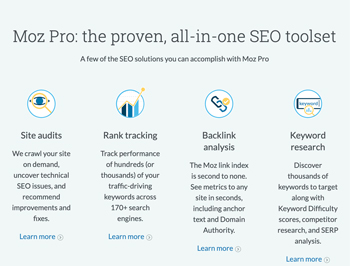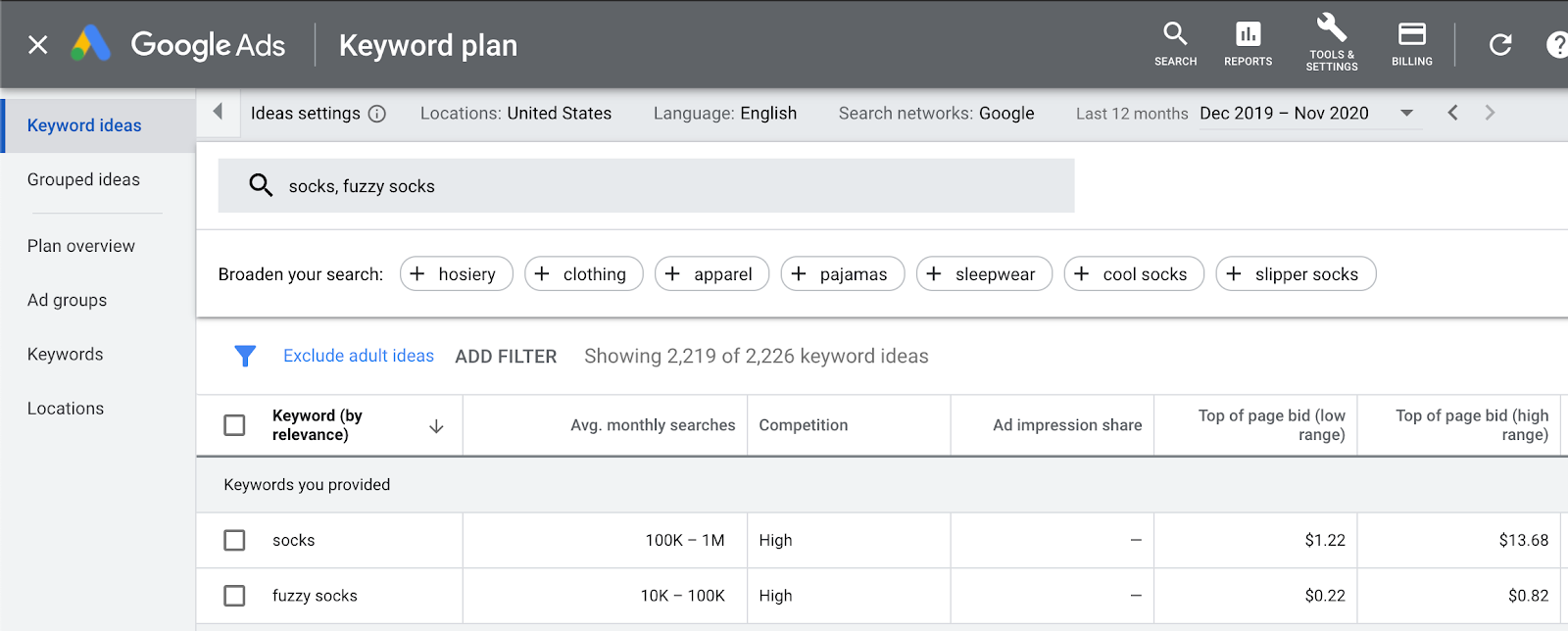Keywords are a crucial part of growing your business through search engine optimization (SEO). Choosing the right keywords for your website will increase your website rank on the search results.
Keywords are how people type into a search engine when searching for a product or service. Keywords can be one word or a phrase. For example, there are a variety of ways that keywords are put into groups based on those specific phrases.
- Socks
- Fuzzy socks
- Best fuzzy socks for winter
- Comfiest socks
These are all different variations of the same keyword, but how you optimize your keywords to increase the results on the search engine page is where keyword strategy comes in and is essential.
Let’s see keywords are so important to optimize your SEO ranking on a search engine.
How to Select Keywords for your Website
When it is time to select keywords for your website or page there are a few steps you should take to optimize your ranking.

1. Review all the pages on your website
Before you start researching what keywords consumers are searching for that relate to your product or service, review your page, and make sure crucial information is on the first page or two of your website.
Many websites find that they have a blog section where keywords are critical to optimizing traffic to their website. When reviewing your pages if you already have started a blog, find the keywords that are working best to optimize traffic.
2. Choose a keyword research tool
There are plenty of free keyword research tools to use when you are just getting started. Google AdWords is a great place to start. It gives you the search volume of those keywords as well as your competition.
 Moz is as well another great tool to conduct keyword research. You will be able to discover and prioritize high-quality keywords to learn more about your audience. Through this service, you will be able to predict how many searches a keyword will receive with about 90% accuracy. They offer a 30-day free trial as well.
Moz is as well another great tool to conduct keyword research. You will be able to discover and prioritize high-quality keywords to learn more about your audience. Through this service, you will be able to predict how many searches a keyword will receive with about 90% accuracy. They offer a 30-day free trial as well.
3. Research the keywords 
Before diving into creating content relevant to your keywords research a few of those keywords that relate to your product or service. One way to do this is to Google the keywords and see what other results come up under suggested.
4. Choose your keywords
When it is time for you to choose your keywords it’s important to use keywords that have a combination of these three aspects:
- High search volume
- Low SEO difficulty
- Low competition
When choosing what keywords you are going to use to optimize search results keep in mind these words have to be what your audience is searching for. If the generator you have used suggests a word that doesn’t make sense to you or looks irrelevant you may want to consider not using it.
What Are Some Different Types of Keywords?
Keywords are one of the best ways to drive traffic to a website. However, there are a few different types of keywords, and knowing these types before diving in is important to receive the best results.
Market segment keywords
These keywords are generic keywords that have to do with the brand or industry. They are a little broader than some of the other keywords we will be getting into.
- Jackets
- Running shoes
- Purses
Customer-defining keywords
Customer-defining keywords are more specific phrases that relate to the customer or audience. They help narrow down the niche of the keyword being searched.
- Warm jackets for men
- Running shoes for comfort
- Purses for women
Product keywords
Product keywords relate to a specific brand. Different brands generally have a strategy for each product and keywords to target the customer effectively. These keywords mention a company directly.
- Apex Bionic Jacket
- Ultra Boost 2.0 Running Shoes
- Cassy Tote
Branded keywords
Branded keywords include the brand’s name. These keywords are far more descriptive to the name of the brand, product type, and product name.
- NorthFace warm winter jacket
- Adidas Ultraboost 2.0 Running Shoes
- Kate Spade Cassie Tote
Short-tail keywords
Short-tail is also known as head keywords are some of the most popular generic keywords. They are very broad and because of this have a high volume of search traffic. Generally, they are one to two words.
- Long sleeve
Mid-tail keywords
Mid-tail keywords as well have a high volume of traffic but are far more competitive. They are generally two to three words and more descriptive than the generic keyword listed above. They are there to narrow down the search results
- Warm long sleeve
Long-tail keywords
Long-tail keywords target a specific niche or audience. They are not high in traffic as the other more broad keywords. Because of this, the competition is not as high which makes them easier to rank. The more specific the keyword the higher the conversion rates.
- Best long sleeve for winter weather
Informational keywords
Informational keywords are words that customers use when they are looking for general information about a topic. This could be they are aware that there is a problem they are having with the current product or service they have and are looking for a solution
- What is the warmest long sleeve for winter?
Transactional keywords
Transactional keywords or “do” keywords are words that consumers use when they are ready to purchase. In this case, the customer knows that they are ready to purchase a product but want to be sure they are receiving the best price.
- Best deal for a long sleeve jacket

When it comes to finding keywords to optimize your SEO and leads be sure to understand how keywords are beneficial to you and your business. There are many different types of keywords that all have different purposes. Keywords are a crucial part of optimizing your website.
A great place to start to optimize your keywords is writing a blog with keywords to jumpstart search results. Sticking to two-three significant keywords, in the beginning, will help rank your website higher on Google search results.

